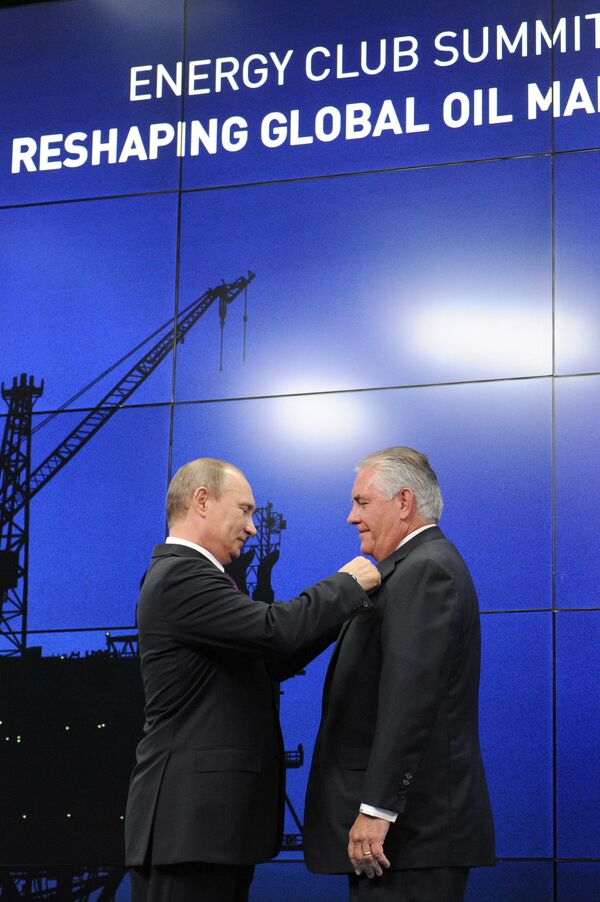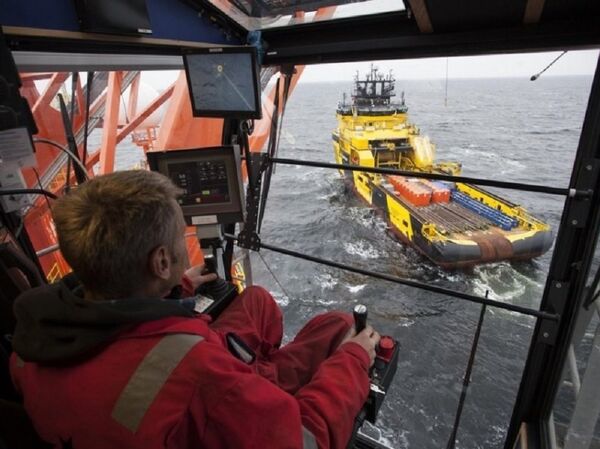ExxonMobil clung to plans to resume cooperation with Rosneft to the last moment before its pullout last week, with US Secretary of State Rex Tillerson believed to have served as the source of the high hopes.
Tillerson served as CEO of the US energy giant between 2006 and 2017, and was particularly keen on initiating new energy projects in Russia during his tenure. The would-be statesman played a key role in penning the agreement with Rosneft on the joint development of oil and gas fields on the Arctic shelf.
In 2013, Tillerson even received the Russian Order of Friendship for his contributions to Russian-American cooperation in the energy sector – cooperation envisioned to last decades and to bring the companies from both countries billions upon billions in profits. The two companies' cooperation included geological exploration in Russia's Arctic shelf, and in 2014, Rosneft drilled the first exploration well in the Kara Sea north of Siberia with a rig provided by Exxon, immediately striking a large oil field, symbolically named 'Pobeda' (Russian for 'Victory').

Cooperation with Russia promised ExxonMobil a black gold bonanza, with Russia's Arctic shelf stretching over six million square kilometers, with oil and gas reserves estimated at least 110 billion tons. The most promising deposits are located in the Barents, Pechora, Kara and Okhotsk seas.
Lost 'Victory'
Unfortunately, as RIA Novosti economic observer Igor Naumov pointed out, Exxon's "first 'Victory' would also be their last, with politics interfering in the economy. In the summer of 2014, Washington introduced sanctions against Russia. [Exxon] froze its cooperation with Rosneft in the Arctic, its losses were then estimated at one billion dollars."
"And that's just the direct damage from freezing promising ventures. Lost profits are estimated in the tens or even hundreds of billions of dollars," the journalist added.
Following the ban on cooperation with Russian energy companies in deep water, Shale and Arctic projects, ExxonMobil's total halt in cooperation became only a matter of time. On March 1, the company officially confirmed its exit from joint ventures with Rosneft due to US and EU sanctions pressure.
Rosneft issued a statement over the news, saying that it would continue to implement projects initiated together with the US company independently. Furthermore, the Russian oil giant has promised to continue cooperating with Exxon on ventures "not falling into existing restrictions," such as projects on Sakhalin Island in the Russian Far East.

According to economist Ivan Kapitonov, ExxonMobil's decision wasn't unexpected, and had been under discussion since 2014. At the same time, the energy expert believes Rosneft's ability to implement its Arctic projects independently will depend on the availability of technologies, equipment, as well specialists with experience in offshore drilling. In Kapitonov's view, Russia should have no problem replacing equipment, which can be built domestically or imported from China. The appropriate specialists, on the other hand, may be more difficult to find.
Fire Shale
In Naumov's view, the pressure on ExxonMobil to give up on its Russian ventures is undoubtedly connected to Washington's vision of making the US the world leader in oil production. The US Energy Information Administration's Annual Energy Outlook 2018, released last month, confirmed these ambitious plans, declaring that by 2022, US plans to export some 5.3 million barrels abroad per day. Total US output is also on the rise, and expected to top 11.2 million barrels in 2019, up from the estimated 10.2 million barrels per day produced currently. The US surge is aimed at, among other things, outpacing the output of current leaders, Russia and Saudi Arabia.
In this sense, Mikhail Portnoy, director of the Center for Foreign Economic Studies at Moscow's Institute of the US and Canadian Studies, says the pressure against Exxon to get out of Russia is part of Washington's larger effort to squeeze competitors out of the market, and not just via economic means. Factually, the analyst noted, Washington's strategy is aimed at stalling the development of new Russian oil and gas fields by depriving the country of Western technologies and equipment.
As for Western sanctions pressure, including in the energy sector, Salameh emphasized that Russia has only benefited from these measures on a macro level, since they have helped pushed the country to diversify its economy and exports.
"Now, the Russian economy can live with a price of oil of $40 or less. It is also signaling that neither low oil prices nor sanctions will deter it from Arctic drilling. Rosneft is getting its drilling activities underway in the Russian Arctic. By so doing…Russia is demonstrating that sanctions did not succeed in putting a crimp on Russia's oil sector," the academic concluded.





